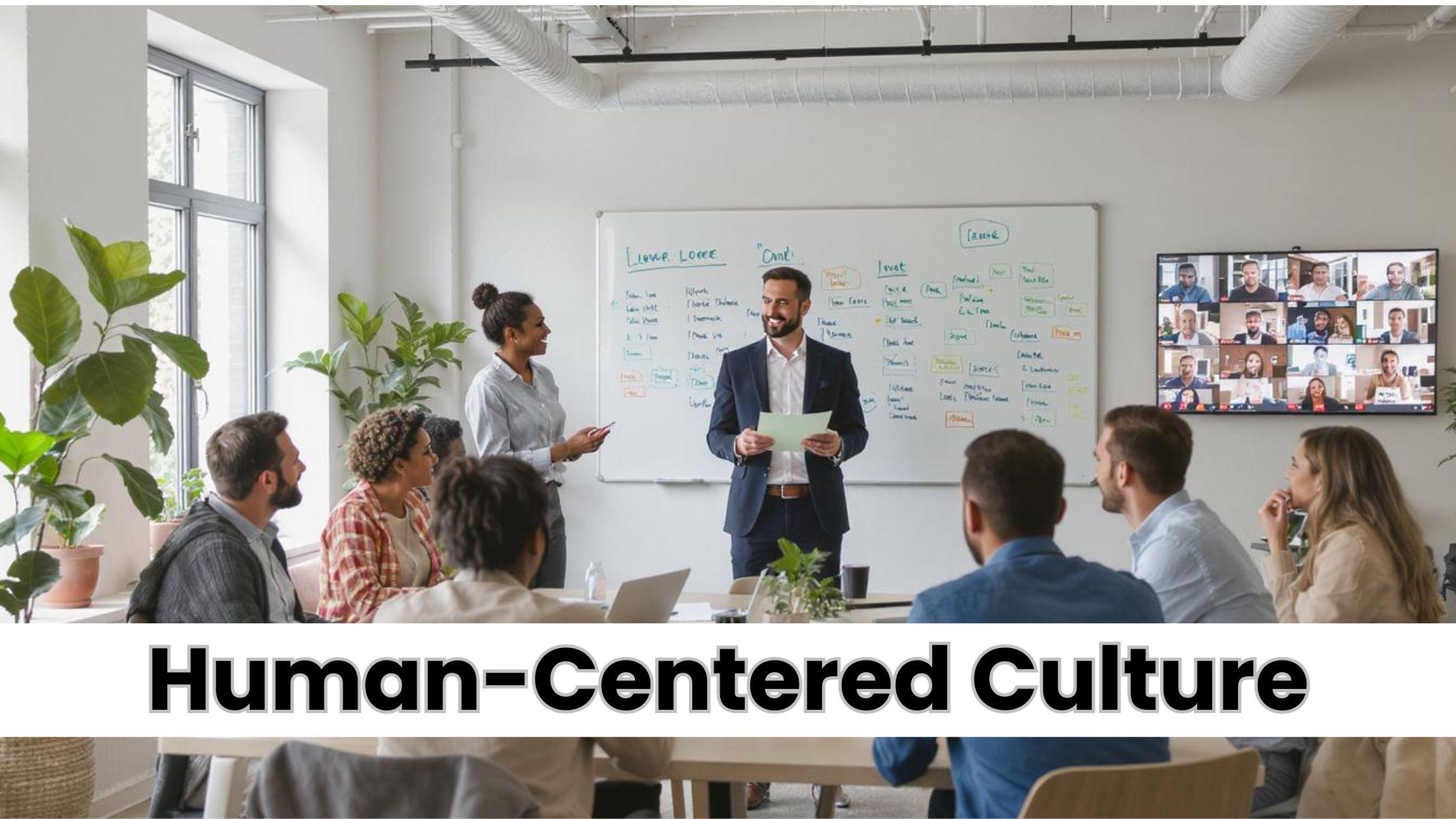The Role of Human-Centered Culture in Workplace Agility

Workplace agility is no longer just about processes or technologies—it begins with people. A Human-Centered Culture puts employees first, ensuring that all organizational changes, innovations, and decisions consider human needs and values. Organizations that prioritize their workforce build the foundation for sustainable agility, empowering employees to adapt, collaborate, and innovate in a dynamic business environment.
Agility Beyond Frameworks
Agile frameworks like Scrum, Lean, and DevOps provide structure, but they cannot replace the impact of a human-centered culture. True workplace agility arises when employees feel valued, trusted, and motivated. When a culture prioritizes human needs, employees are more likely to embrace change, contribute innovative solutions, and respond quickly to evolving challenges, making agility both practical and sustainable.
Empowerment as a Core Principle
Human-centered cultures empower employees to take ownership of their work, make decisions, and explore new approaches. Empowered teams are agile by nature because they have the autonomy and confidence to act when circumstances change. By fostering ownership and accountability, organizations create a workforce capable of responding effectively to unexpected challenges while maintaining productivity and engagement.
Psychological Safety Drives Innovation
Psychological safety is essential for fostering workplace agility. Employees who feel safe to voice opinions, share ideas, and learn from mistakes are more likely to innovate and adapt. Human-centered cultures encourage risk-taking and experimentation by reducing fear of failure. Teams that operate in a safe and supportive environment can pivot quickly, turning challenges into opportunities for growth.
Leadership That Inspires Agility
Leaders play a pivotal role in promoting human-centered agility. Command-and-control leadership can stifle creativity, slow decision-making, and reduce engagement. In contrast, empathetic and inclusive leaders create an environment where employees feel supported, motivated, and confident to embrace change. Leadership that values people fosters trust, collaboration, and continuous improvement, driving organizational agility.
Technology Supporting Human Needs
While technology is crucial for efficiency, it cannot drive agility alone. Human-centered cultures ensure that technology enhances employee productivity, decision-making, and engagement rather than adding pressure. Aligning tools with human needs allows employees to focus on creativity, collaboration, and problem-solving, which are the true drivers of agility in the modern workplace.
Collaboration as a Cultural Norm
Agility depends on collaboration, and human-centered cultures foster open communication, knowledge sharing, and teamwork. Employees who feel included and respected are more likely to work cross-functionally, brainstorm innovative solutions, and respond quickly to changes. Embedding collaboration into the culture ensures that agile practices are sustained and effective across all organizational levels.
Engagement and Adaptability
Employee engagement is a key determinant of agility. Engaged employees are more committed, proactive, and responsive to change. Human-centered cultures enhance engagement through recognition, professional development, and inclusive practices. When employees feel connected and supported, they are better prepared to adapt to new situations, implement innovative solutions, and sustain high performance.
Continuous Learning for Agile Workforces
Agility requires a commitment to learning and growth. Human-centered cultures promote continuous learning by offering training, mentorship, and career development opportunities. Employees who are supported in skill-building and knowledge acquisition can adapt to technological advancements, market changes, and evolving customer needs. This learning-oriented culture ensures that agility remains embedded across the organization.
Resilience Through Employee Support
Resilient employees are essential for maintaining workplace agility. Human-centered cultures prioritize mental health, well-being, and work-life balance, enabling employees to recover from setbacks and remain productive. Resilience supports innovation, adaptability, and long-term success, making human-centered practices critical for sustainable agile organizations.
Diversity and Inclusion Strengthen Agility
Agile organizations benefit from diverse perspectives. Human-centered cultures prioritize inclusivity, ensuring that all employees feel valued and empowered to share their insights. Diverse teams are better equipped to solve complex problems, innovate, and respond rapidly to change. Inclusion strengthens collaboration and enhances overall organizational agility.
Customer-Centric Agility
Employees in human-centered workplaces are more empathetic and responsive to customer needs. Their engagement translates into better service, faster problem resolution, and stronger customer relationships. Aligning employee-centric practices with customer goals creates a culture of agility that supports both internal efficiency and external satisfaction.
Embedding Agility in Daily Operations
Workplace agility is most effective when it is embedded into the organizational culture. Trust, transparency, collaboration, and inclusion must be integrated into daily practices. By placing humans at the center of operations, organizations empower employees to respond flexibly, make informed decisions, and maintain continuous adaptability in a dynamic business environment.
Balancing Innovation and Stability
Agility requires a careful balance between innovation and operational stability. Human-centered cultures allow experimentation while providing a structured and supportive framework. Employees can explore new ideas without fear, ensuring innovation does not compromise consistency, performance, or well-being, which is essential for sustainable agile organizations.
The Future of Human-Centered Agility
The future of agile workplaces depends on organizations that place people first. By embedding a human-centered culture into strategy, operations, and leadership practices, companies foster environments where employees thrive, innovate, and adapt. Agility becomes a natural outcome of human-first principles, positioning organizations for long-term resilience, competitiveness, and success.
Read Full Article : https://bizinfopro.com/blogs/it-blogs/how-digital-twins-are-quietly-disrupting-it-operations/
About Us : BizInfoPro is a modern business publication designed to inform, inspire, and empower decision-makers, entrepreneurs, and forward-thinking professionals. With a focus on practical insights and in‑depth analysis, it explores the evolving landscape of global business—covering emerging markets, industry innovations, strategic growth opportunities, and actionable content that supports smarter decision‑making.
- Vibnix Blog
- Politics
- News
- Liberia News
- Entertainment
- Technology
- Education
- Art
- Causes
- Crafts
- Dance
- Drinks
- Film
- Fitness
- Food
- Games
- Gardening
- Health
- Home
- Literature
- Music
- Networking
- Other
- Party
- Religion
- Shopping
- Sports
- Theater
- Wellness



